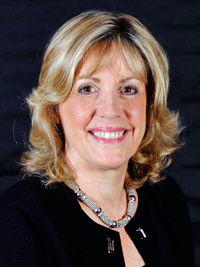Rosemary Parr founded the Global PA Association and Training Academy in 2006 following a career with some of the UK’s largest companies and in the UK Parliament. Over the last decade, Rosemary has established the organisation as a leader in the training and development of office professionals, travelling the world to deliver training programmes and motivational talks to managers and office professionals. The Global PA Association brings together office professionals, including executive assistants, personal assistants, secretaries and administrators from across the globe to provide networking and training opportunities, as well as supporting career development.

“…Only about 1-2% of the profession is male. There are some male PAs out there, but I think the job role would have changed if there were more…”
From London to New York
I trained as a personal assistant myself when I left college, and I did a year’s full time study at the London Chamber of Commerce for the Private Secretary’s Certificate. We studied business, finance, and short hand, as well as achieving advanced typing speeds etc.
Following this I went to work at the advertising agency, J. Walter Thompson, where I worked for a Member of Parliament who was an associate director. Eventually, half my salary was paid by the House of Commons and the other half was paid by J. Walter Thompson. I would go down to the Houses of Parliament every morning and we’d meet to look at the constituency post together and decide what needed to be responded to urgently. I would then be left to go back to J. Walter Thompson and work from there.

Losing it all, but finding my passion for people development
When I got married and had my children, I didn’t work for 12 years. The reason I’m so passionate about people development is when my children were 5, 9 and 12, my husband’s business failed and we lost everything. He wouldn’t work and we lost a beautiful five bedroom home. We had two luxury cars in the drive and two holidays a year, and it all fell down around us like a pack of cards.
I decided that the only way out was to pack myself and the kids up and move on to a little rented house in a local village. We had to claim state benefits for the next seven years. Being completely wiped out was what started my passion for people development, because I had to find that strength within myself.
I knew I had to look after the children and sort out their education. I was battling in the courts for maintenance – I was battling on many fronts, so I forgot about being a PA. I didn’t know how I could cope with the hours. I was doing cleaning, bar work, waitressing and selling cosmetics. I did all of that for a while to keep us afloat.
A turning point in my life
As the children got older, things got a bit easier and I thought to myself: “Come on! You were a top PA!” I wanted to get back into that, so I started some temp jobs. I ended up as a temp going into BT, and within a year I was working for the chairman. That really was a turning point in my life, a huge moment.
By this time I already had a vision that I wanted to develop, motivate and inspire others, but I didn’t know how I would go about it. I was very passionate about health and healing because I’d been warned that if I didn’t manage my stress levels I would get ME, so I also got into healing in order to help myself and I relied on alternative therapies.
Regaining my career prestige
BT was the right move because working for the chairman gave me prestige again, so I could use that prestige and position to help other people. I set up a PA network and community in BT, supported by the chairman.

Training as a coach
From what I started in BT I could see there was an opportunity with all of this. I’d already asked them if they would support me training as a coach, and they funded me to go on an external programme, which was life-changing. I thought I could stay with BT once Sir Christopher Bland retired – he was only ever going to be chairman there for about six years – and the HR team kindly found me another position.
I was very passionate about charities, so they offered me a job in the corporate responsibility team, managing charity events. I worked with Childline and Esther Rantzen. After six months, when my chairman went, I decided my passion was in people development, and that I wanted to develop my coaching and training skills. This is when I left and set up the Global PA Association.
At the same time I went back to college part time in the evenings and got my CIPD qualifications as a trainer / learning and development practitioner.
Setting up the Global PA Association to support other PAs
Literally within a couple of months of starting the Global PA Association I was invited to speak at a conference in Australia. I was flown out there. It was fantastic. I shared the conference platform with Richard Branson’s PA, Penni Pike, who had been with him from the beginning. She’d just retired after working with him for 31 years.

Professional membership and training
We offer membership and we have a code of practice for our members. We have a member’s area on our website with tools and tips, and resources they can download, such as podcasts they can listen to. This time last year we liaised with the BBC World Service, who did a 25 minute programme on the role of the executive PA, and how vital they are.
As well as professional membership, we offer training. Some of our courses are already accredited by the ILM (the Institute of Learning and Management) and we’re getting the rest accredited by the end of the year. We have ILM recognised status and CPD recognised status with our courses because I want to give PAs something substantial for their CVs. We also partner with Birkbeck University in London.
Another nice side of it is the networking evenings and events with supplier partners. At the moment we do those in Central London.
When I’m working overseas I either go to a company who invite me in, fly me out to run an in-house programme for their company, or I work with conference and event producers in those areas. They would ask me to come along and run a two or three day programme for them.
My role on a day to day basis
We run courses every month, so I spend a lot of time marketing – reminding PAs that the courses are happening and what the benefits are. The rest of the time I’m developing courses for clients.

At the moment I’m also running our programme on Saturdays at Birkbeck. I juggle many things and I’ve become a real expert in multitasking!
A predominantly female role with its prestige under threat
The problem with the role of PA is that it has stayed predominantly female for far too long. Research shows that it is one of the most consistently gendered occupations for women. This is why so many PAs are treated so badly.
It’s down to individual bosses and whether the culture of the organisation means PAs are receiving proper recognition or not. The problem we have now in the 21st century as organisations try to cut their admin costs is that they are piling the pressure on PAs to work for three, five, seven, ten people. There’s also flatter structures in organisations, so there’s often a team of 30 or 40 people.
It is dependent on the trends in a particular industry, but banking and accountancy are going that way, so PAs are losing the prestige of their position. In some organisations they’re having to work for so many more people, it’s therefore much harder to do a good job for anyone, and the result is that their morale dips.
Research from UKCES which says that secretarial function could be under threat long term is interesting. I think we will still have PAs working for top directors on a one to one basis and we’ll have the team PAs at the bottom, but it’s the bit in the middle which is filled by lots of PAs aged 40 plus whose jobs are potentially under threat. This is why I’ve been saying to them for ten years now: “You must develop your CV. You’ve got to upskill.” When I first started the Global PA Association I kept thinking I was ahead of my time, but now I’m sadly being proved right. It’s a real problem.
Only about 1-2% of the profession is male. There are some male PAs out there, but I think the job role would have changed if there were more. The statistics are that men at work still earn more than women, and people listen to men more.
Lack of scope for PAs to grow and develop
The majority of bosses are still men – and not all men are awful, of course – there’s many lovely men out there. (There’s also some awful female bosses…) The problem we’ve got is when bosses get a good PA they don’t want them to grow and develop because they’re frightened they will leave. [You can read more about this in the following research report: Still in the Ghetto? Experiences of Secretarial Work in the 21st Century by Catherine Truss*, Kerstin Alfes, Amanda Shantz and Amanda Rosewarne.]
I’ve seen PAs come through the Birkbeck programme who have changed jobs. I’ve had people come on my masterclasses and I’ve opened up their creativity and thought processes, so they’ve left their jobs. I’ve also seen others who go back to working saying: “It’s fantastic. I’ve learned so much. I feel supported and I can now do a better job for my boss.” It’s a problem, but the bosses hold on to them – they can be a little bit selfish about it.
All too often PAs don’t feel valued, cherished and nourished, and every time they ask to go on a training programme they’re told: “No. There’s no budget.” Many companies won’t give them a day off for training either. I ran a training session in London last week and about a third of the attendees said they’d had to take a day’s holiday to be there.
Career pathways for PAs
In most organisations there’s no career pathway for PAs. The glass ceiling is very evident. There aren’t many chief of staff roles around now to progress into – those jobs have disappeared. Sometimes PAs can move into HR positions and go on to get their CIPD qualifications. Other times they can move into event management in the organisation, so there are ways, but it’s up to each PA to negotiate and push themselves.

Many PAs now can work flexibly, so they often work three days in the office and two days at home. It’s dependent on the culture of the organisation – some aren’t open to it, but many have that flexibility now. For example, I have one member who’s based in Birmingham but she comes down to London at least a couple of days a week to be with her manager.
It is a real mixed bag, but the public sector is often better. I have quite a few PAs from the NHS and London universities coming on our courses. Salaries are lower, but PAs do get training and development opportunities, which are often denied in the private sector.
Coming up next for me and the Global PA Association
I’m off to do some training in Saudi Arabia for a university’s executive PAs, and then I’m off to Kuala Lumpur, Singapore and Bangkok.
I’m also going on a UKTI Trade Mission to Saudi Arabia and Bahrain, which is all to do with education and training.
We’ve got training happening in London up to Christmas, and we’re organising some events with suppliers. I’m busy but I wouldn’t have it any other way.
http://www.globalpa-association.com/
https://twitter.com/TheGlobalPA
https://twitter.com/rosemaryparr
https://en-gb.facebook.com/globalpaassociation/






